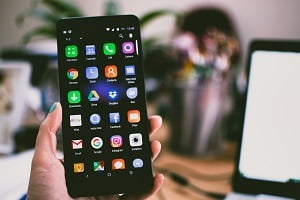19 Best Apps to Improve Mental Health
Looking after our mental health has become one of the main priorities in the modern age. Healthcare providers, governments and even employers are all encouraging wellbeing tactics and are emphasising the importance of taking care of our cognitive health.
In such unprecedented times as during the Covid-19 pandemic, taking mental health issues seriously has been pushed to the forefront and put on par with other health issues such as obesity, diabetes, and alcohol addiction.
Fortunately for us, the stigma around mental health is being reduced and more open conversations are being had. This is particularly prevalent on social media and among celebrities and influencers. [1]
While contraindications exist about the digital age and mental health issues, there is no doubt that technology has pushed resources and knowledge around wellbeing and emotional health up a notch. In this post, we will take a look at the variety of mental health apps that can help tackle a wealth of problems from eating disorders, depression, to PTSD.
Why Mental Health Apps Make A Big Difference
The Center For Disease Control and Prevention has conducted research which indicates that around a quarter of the adult population has suffered, or will suffer from mental health issues at some point during their lives. [2]
With more people being diagnosed with mental health conditions, and more people talking about their problems openly, a gap has opened in terms of accessing resources and learning more about these types of conditions. In this digital age, where more than 3.5 billion people worldwide own a smartphone [3] what better way to access these resources than through smartphone apps?
Mental Health Apps: Removing Barriers To Treatment
One of the main benefits of tackling mental health issues through smartphone apps is that they are accessible to anyone. No doctor’s appointment, psychiatric assessment, or labelling is needed in order to download and use these types of applications. The cost element is a bonus too. With increasing pressures on public health bodies and government funding, little budget is left allocated to mental and emotional health.
Free, accessible and easy to use apps are therefore a saving grace. Time is another element that propels the efficiency of these apps: there are no waiting lists, appointment slots, or balancing therapy among busy schedules. Face-to-face meetings are kept to a minimum when smartphone owners can access these therapies from their own homes, in their own times.
Within seconds, users can download apps that help alleviate symptoms of anxiety, depression, anger issues and more. Although there is no guarantee that each app has peer-reviews or has been scientifically backed, mental health experts have predicted that these types of apps will play a vital role in the future of mental wellbeing. They encourage autonomy and self-awareness of mental health conditions, and offer intuitive and productive solutions for conditions that may or may not need therapy.
Without a doubt, more guidance and systematic approval is needed before introducing these apps as a form of prescribed treatment for severe conditions. But according to researchers at the American Psychiatric Association [4] research is being channelled into an app-rating system for psychiatrists and healthcare professionals in order to be recommended to clients.
19 Mental Health Apps To Try Today
Our researchers have compiled a list of the top 25 apps which help users cope with a variety of mental health conditions. Take a look at the list below and see if any of these would benefit you:

Apps for anxiety
For those struggling with anxiety, these apps may help alleviate symptoms in a variety of different ways:
1. Mindshift
Supported by Healthy Young Minds, Mindshift is an app aimed at teens and young people which helps them learn about, and cope with their anxiety. This is compared to general advice on how to avoid anxiety. This app aims to help youngsters change the way they think about anxiety, and use it as a positive in their lives.
2. Moodfit
This app is all about recognising and understanding the mood you’re in. Users are required to enter mood diary entries throughout the day, and the app will then provide them with daily goals, gratitude exercises, and positive reinforcing messages.
3. Headspace
One of the most critically acclaimed apps among millennials and mental health advocates is Headspace. It projects meditation as a concept of ancient ritual and modern science, and provides hundreds of thousands of guided meditations that are always new and improved.
4. Sanvello
‘A place to feel better: wherever you go’ is the strapline of Sanvello. It offers psychologically-proven therapies to help with anxiety, depression and stress. Expect guided journeys, coping tools and progress assessments on your journey to a stress-free life.
Apps For Depression
There are a variety of mental health resources available for those suffering from depression. We have rounded up the best apps below:
5. What’s Up
Aimed at corporations and organisations, What’s Up is an interactive app that provides daily tools to promote positive mental wellbeing. Its sections include: my mood, my thoughts, concerns for someone, and wellbeing 5 steps among many more.
6. Happify
Simply put, Happify intends to help users overcome life’s negativities, stresses and challenges. It enables you to break old habits to form new and happier feelings. They provide games and exercises to boost cognitive health.
7. Talkspace
Think of Talkspace as a directory for licenced and accredited therapists. They offer trained, unbiased and professional perspectives on any issues you may have. Simply sign up and start talking to an online therapist within minutes.

Apps For Eating Disorders
Living with an eating disorder can be a lonely and overwhelming experience. Take a look at these apps as they offer support, guidance and scheduled eating patterns:
8. Rise Up & Recover
The number one app to treat eating disorders boasts a tool which logs meals, emotions and behaviours. It encourages self-monitoring and has a PDF export tool so users can share with licenced professionals. It also sets custom reminders and prompts at mealtimes, and shares positive images and affirmations to promote recovery.
9. Recovery Record
Recovery Record boasts as its main components a ‘keep on track’ function, an ‘encouraging and rewarding’ tone and ‘collaboration’ to keep users connected with their dietitians and therapists.
10. Nourishly
Aimed at improving relationships between patients and food, this app ‘takes into account the whole person.’ It tracks hunger and fullness, stress levels, sleep patterns, digestive problems and personal insights.
Apps For Suicide Prevention
Suicide claims the lives of nearly 800,000 people worldwide per year – that’s one life every 40 seconds. If you’re feeling suicidal or like your worries are just too much to handle, these apps below have been proven to help:
11. Stay Alive
This is the UK’s ‘pocket suicide prevention resource’ aimed at those struggling with suicidal ideation or intent, and families of those who are. It includes a safety strategy, a ‘reasons for living’ section that users can customise, and an all-important life box to store photos that mean something.
12. Talk Life
Talk Life is a safe and confidential place where those struggling with suicide can speak to people who care and who want to listen. Their large community has thousands of users who all share what’s on their minds and support those in crisis.

Apps For Substance Addiction
The substance abuse recovery community is a great place – online as well as in person. These apps are all acclaimed in helping those recovering from substance addiction stay sober and focused:
13. Sober Grid
The world’s largest online sober community is highly accessible and free. It lets you track your progress in recovery and share with others for support or motivation. Options are public and private if you want to log your own journey too.
Apps For Post Traumatic Stress Disorder
Interestingly, the science and methodology behind trauma therapy goes hand in hand with app development. Here are the best two apps for PTSD we could find:
14. PE COACH
Designed specifically for those with PTSD, this PE coach app works with Prolonged Exposure techniques to help reduce distress and panic about a particular trauma. It enhances education about trauma, and is generally recommended alongside regular therapy.

Apps For Bi-polar Disorder
Research into apps for treating disorders such as bipolar and schizophrenia is scarce, but on the rise. Here is a useful app for those living with bipolar disorder:
15. eMoods
This is a mood-tracking app specially designed for those living with bipolar disorder. Users can enter their mood daily or multiple times a day using a four-point scale of ‘none’ to ‘severe.’ Psychotic symptoms are also recorded, as well as behavioural data and sleep patterns.
Apps for Obsessive-Compulsive Disorder
Below are details of an app that not only helps with OCD, but with stress symptoms and anxiety disorders too:
16. Worry Watch
The ultimate anxiety journal promises to challenge your negative thoughts and change them into pragmatic perspectives. It works in a four-step process: record what is bothering you; reflect if the outcome was as bad as you presumed; use a dashboard to reason with your thoughts; and lastly, refute your worries by realising they were unfounded.
Apps For Self-Harm Prevention
It’s important to remember that self-harm itself is not a condition: it is the sign of an underlying mental health disorder. Take a look at this app below for more help:
17. Calm Harm
This app was designed solely to prevent self-harm by reducing urges and offering preventative techniques. Based on the principles of dialectical behavioural therapy, it provides users with a list of tasks they can utilise as distractions.
Apps For Panic Disorder
These apps can also be used to treat anxiety and depression, by changing the way users think:
18. The Worry Box
Similarly to CBT techniques, the Worry Box encourages users to discover practical solutions to their worry. Users rate their worries, which then produces supporting statements to deal with those issues. This is all about identifying and compartmentalising your worries into digestible columns.
19. Panic Shield
This is a breathing tool to help protect users from panic attacks. It works by calming users down before or during a panic attack and trains the mind to not fear bodily functions like the fight or flight mode. It also trains the body and mind to not be scared of external situations that trigger panic.
Do Mental Health Apps Threaten The Future Of Conventional Therapy?
Many mental health experts believe more people will now be accessing some form of treatment (albeit generalised and in digital-format) than ever before. This could be down to the ease and accessibility of mental health apps, as some people may suffer from social anxiety and may be unable to leave their homes.
Others may be too scared to seek face-to-face help, or may fear their problems aren’t ‘big enough’ to warrant seeing a therapist or accessing mental health services from their local healthcare ‘providers. Others may be limited by financial restrictions, and the appeal of a free or very affordable app is undeniable.
Anonymity is a force when it comes to the future of mental health apps. Users are protected by anonymity, privacy and confidentiality – which of course, they are under the healthcare act. But attending to their own mental health needs, without the shame or perceived judgement of visiting a psychiatrist or counsellor, will mean more people addressing their emotional and cognitive needs.
Professionals do however still maintain that conventional therapy and counselling is the most effective method, especially while the research field remains so undiscovered and open regarding using apps to treat mental health needs. These experts believe that while apps do support and help those who cannot attend therapy as regularly as they need to, digitally-based techniques such as apps cannot replace tried and trusted methods. [5]
Conclusion: Ensuring Safety And Trying Out The Apps
Trying out these apps can increase self-confidence, help users relax and become mindful, and can overall boost mental health in many ways. But the head of the mental health charity Mind, Stephen Buckley, [6] claims it is vital that these apps do point users in the right direction if their symptoms are severe and especially life-threatening. He points out that these apps should never yield to being substitutes for mental health services, but should instead highlight that they are there to support and boost day-to-day mental health.
App providers must ensure that their programmes are well maintained, monitored, and upgraded regularly to ensure users are not just getting the best out of them, but are cared for and moderated to ensure they are safe. Thus, Stephen Flatt, Psychological Therapies Unit director, recommends looking at the list of health body regulated apps to ensure that users are downloading ones that are reliable and approved.
He fears that with half a million mental health apps infiltrating the web, many won’t be able to differentiate the ‘wheat from the chaff.’ If you are unsure about the credibility of an app, head over to the NHS website [7] to view their credentials and reliability.
References
[1] https://www.nhs.uk/conditions/stress-anxiety-depression/
[2] https://www.cdc.gov/mentalhealth/learn/index.htm
[3] https://www.bankmycell.com/blog/how-many-phones-are-in-the-world
[4] https://www.psychiatry.org/psychiatrists/practice/mental-health-apps
[5] https://adaa.org/finding-help/mobile-apps
[6] https://www.mind.org.uk/
[7] https://apps.beta.nhs.uk/category/mental_health/




